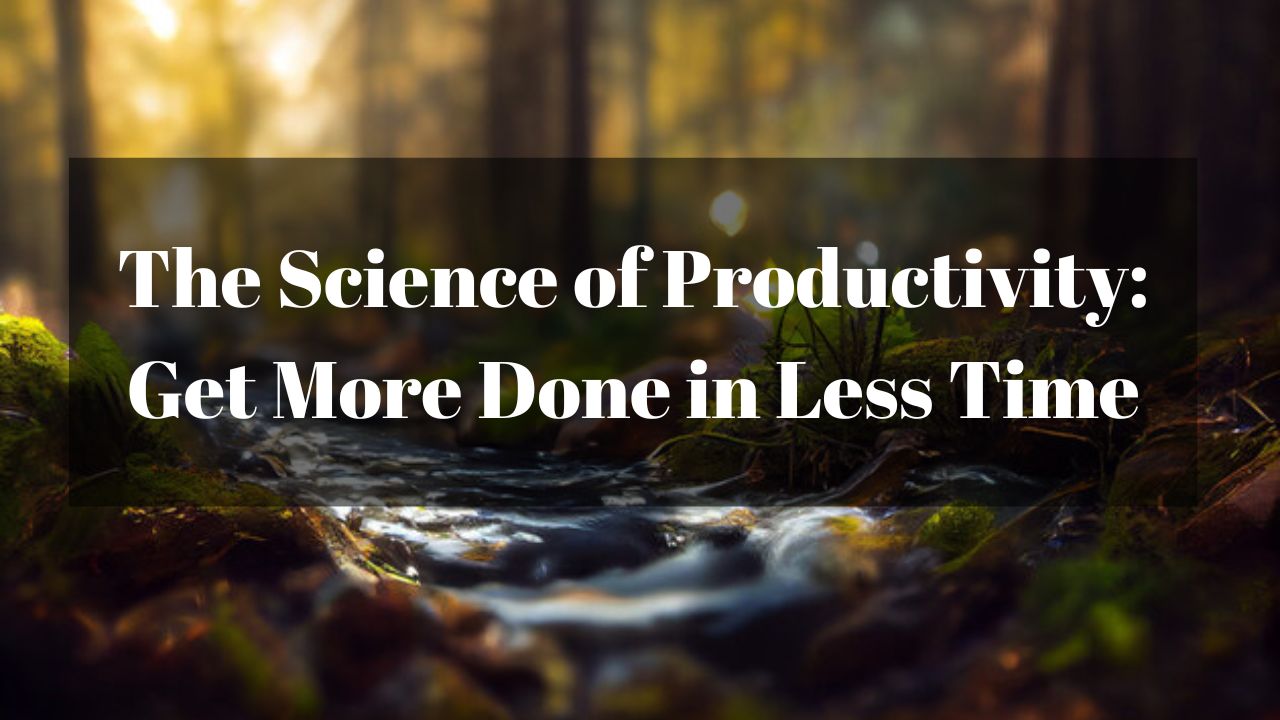The Science of Productivity: Get More Done in Less Time
In today’s fast-paced world, the ability to enhance productivity has become a crucial skill. Whether you’re a student, a professional, or an entrepreneur, mastering the science of productivity can significantly impact your success. In this article, we will explore the principles and strategies backed by science to help you achieve more in less time.
Understanding Productivity
Productivity is more than just staying busy; it’s about achieving meaningful results efficiently. Scientists have delved into the psychology and neuroscience behind productivity to uncover strategies that can make a real difference. By understanding the science behind productivity, individuals can tailor their approaches to optimize their performance.
The Power of Planning
One of the foundational elements of productivity is effective planning. Research suggests that individuals who plan their tasks are more likely to accomplish them. The brain craves structure, and creating a plan helps activate the prefrontal cortex, responsible for decision-making and goal-setting. Utilize tools like to-do lists, calendars, and project management apps to organize your tasks and set priorities.
Prioritization and Time Blocking
Not all tasks are created equal. The Eisenhower Matrix, a prioritization tool, categorizes tasks into four quadrants based on urgency and importance. Focus on tasks that fall into the “Important and Urgent” quadrant to maximize productivity. Additionally, time blocking involves dedicating specific blocks of time to particular tasks, minimizing distractions, and enhancing concentration.
The Pomodoro Technique
Named after the Italian word for tomato, the Pomodoro Technique involves breaking work into intervals, traditionally 25 minutes in length, separated by short breaks. This approach leverages the brain’s natural rhythm, promoting sustained focus and preventing burnout. After completing four cycles, take a more extended break to recharge. Many find this method effective in maintaining high levels of productivity throughout the day.
Optimizing the Work Environment
Your surroundings significantly impact your productivity. Scientists emphasize the importance of a clutter-free and organized workspace. A clean environment reduces cognitive load, allowing the brain to focus on the task at hand. Consider incorporating elements like natural light, ergonomic furniture, and plants, which studies show can enhance overall well-being and productivity.
Mindfulness and Meditation
Mindfulness, rooted in ancient practices like meditation, has gained recognition in the scientific community for its positive effects on productivity. Taking a few minutes each day to practice mindfulness can improve attention, reduce stress, and enhance overall cognitive function. Apps like Headspace and Calm offer guided meditation sessions that are easy to incorporate into your daily routine.
Sleep Quality
The relationship between sleep and productivity is well-established. Lack of sleep impairs cognitive function, attention, and decision-making. Prioritize quality sleep by maintaining a consistent sleep schedule, creating a comfortable sleep environment, and limiting screen time before bed. Adequate sleep not only boosts productivity but also contributes to overall well-being.
Nutrition and Hydration
The fuel you provide your body has a direct impact on cognitive performance. Maintain a balanced diet rich in nutrients, with a focus on whole foods. Stay hydrated throughout the day, as dehydration can lead to fatigue and decreased cognitive function. Small, frequent meals can help sustain energy levels and prevent the midday slump.
Regular Exercise
Physical activity has profound effects on the brain. Regular exercise improves memory, cognitive function, and mood. Incorporate both aerobic exercises, like running or cycling, and strength training into your routine. Even a short, brisk walk during breaks can re-energize your mind and enhance productivity.
Continuous Learning and Skill Development
Investing time in learning and skill development contributes to long-term productivity. Acquiring new knowledge stimulates the brain and keeps it agile. Platforms like Coursera, Udemy, and Khan Academy offer a plethora of courses on various subjects. Set aside dedicated time for learning to stay ahead in your field and enhance problem-solving skills.
Conclusion
The science of productivity offers valuable insights into optimizing your time and efforts. By incorporating planning, prioritization, and mindful practices into your routine, you can unlock your full potential and achieve more in less time. Experiment with different strategies, and tailor them to your unique needs and preferences. Remember, productivity is a journey, and continuous improvement is the key to sustained success.
Thanks for visiting Respect Lifestyle











